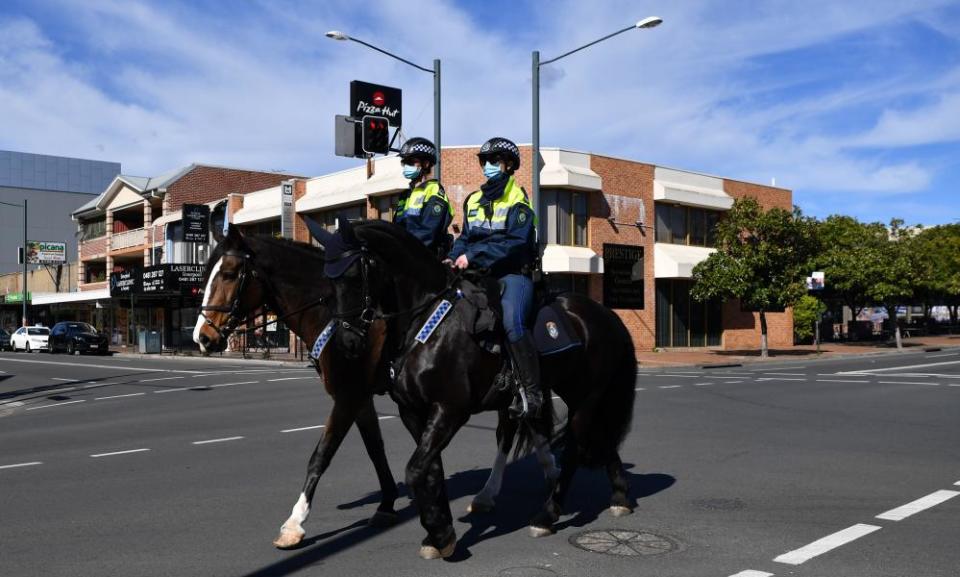Unfair Covid fines causing hardship and should not be enforced, advocates say

An alliance of legal services have urged the New South Wales government to to stop chasing people to pay Covid fines, saying have been issued incorrectly and have disproportionately hurt Indigenous Australians, homeless groups and people living with a disability.
The Redfern Legal Centre, Public Interest Advocacy Centre, and Aboriginal Legal Service are among 33 groups who have written to NSW finance minister Damien Tudehope, calling for him to take “urgent action” to address the hardship and unfairness caused by Covid fines.
The groups say their experience in assisting NSW residents with fines show that a “significant” number were issued either incorrectly or unfairly. They say enforcement action is having a disproportionate impact on disadvantaged and marginalised groups, who have the least capacity to pay.
Related: Western Sydney disproportionately fined for Covid lockdown breaches
Data obtained by the Redfern Legal Centre shows that in July, August, and September this year, 47,414 fines were issued for breaches of public health orders, creating $43,234,340 in debt.
The legal services say almost 18,000 fines are still unpaid and 99% have been escalated to enforcement.
“The data RLC uncovered clearly shows that a significant number of people are struggling to resolve their fines, many of which we believe have been wrongly issued,” Redfern Legal Centre chief executive, Joanna Shulman, said. “We are asking for a reprieve over the holiday period to give people additional time needed to seek advice and obtain a fair and just resolution of their fines.”
Adjusting for population size, the local government areas with the largest volume of fines are Brewarrina, Coonamble, Gilgandra, Moree Plains, Walgett, Bourke and Gunnedah.
Those LGAs all have significant Indigenous populations.
“We are very concerned about the disproportionate impact of PHO fines on groups already experiencing hardship,” the 33 groups said in their open letter to Tudehope.
“The experience of legal services also suggests that marginalised and disadvantaged groups such as people experiencing homelessness and people with psychosocial disability have been disproportionately issued PHO fines.”
The groups say they are being inundated with requests for help, and want the NSW government to pause the enforcement program for four months.
“We are concerned that people who are unable to engage legal help because of their circumstances will be left with an unjust fine debt,” the letter says.
Piac chief executive Jonathon Hunyor described the police approach to issuing fines as “heavy-handed and inflexible”.
“We now have many people who will struggle to pay fines and need time to get help and consider their options,” he said.
Homelessness NSW, one of the signatories to the letter, has warned fines are hurting those experiencing homelessness disproportionately. The impact was particularly pronounced for Aboriginal people experiencing homelessness, according to the organisation’s chief executive, Katherine McKernan.
“During the Covid lockdown, people experiencing homelessness were also less able to adhere to the stay at home orders and needed support to stay safe from Covid rather than being fined simply because they had nowhere to go,” she said.
Related: The pandemic has forced ‘safe, comfortable’ Australians to confront human rights. So what’s next?
The Redfern Legal Centre data further highlights a trend revealed by similar statistics on Covid fine enforcement.
In a report released in October, the NSW Bureau of Crime Statistics and Research found police disproportionately fined residents of western Sydney for Covid-19 breaches during the Delta outbreak, despite surveys suggesting its residents were among the most compliant in the state.
The crime statistics agency has warned the high volume of fines issued to residents in Sydney’s areas of concern would pose a “significant burden for some sections of the community who are already vulnerable” and urged the government to monitor the longer-term impact of the police response.
Samantha Lee, a police accountability solicitor at Redfern Legal Centre, has previously told the Guardian that “the majority” of cases the organisation is dealing with should arguably be withdrawn.
“We are of the view that in the majority of the cases coming to us, the police have applied the law incorrectly,” she said.
“I believe that we’re not even at the tip of the iceberg. I think we’re looking at a systemic failure by the police. There will be I think thousands more fines that have potentially been issued incorrectly.”
Tudehope’s office was approached for comment.

 Yahoo News
Yahoo News 